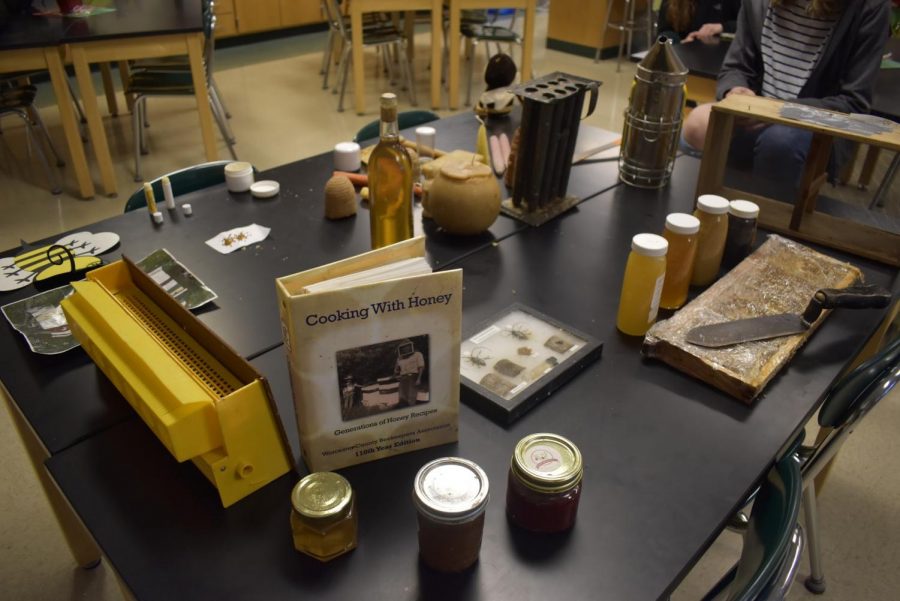What’s the buzz?
Beekeeping Club plans to build boxes, break stigma
Bee-keeping related items such as honey and recipe books are often used during meetings after school most Tuesdays in D216.
March 7, 2018
The beekeeping club is building bee boxes to sustain a hive in the courtyard garden and plans to set them up in the spring of 2018.
Members of the beekeeping club hope that these bee boxes will make people more aware of the impact of bees on the the environment.
“Our end goal was to establish a hive on campus, probably in one of the gardens, in order to educate students and also to have it be available for science classes to work on,” junior Elsa Ray, co-president of the beekeeping club said. “We want to help members of beekeeping club and people outside the beekeeping club get a hands-on experience working with bees and see how amazing they are.”
Bee boxes are wooden boxes with sheets of honeycomb inside, which are meant to simulate real hives. Beekeepers can manage their hive with these boxes while keeping the bees satisfied with their environment.
“Bee boxes are basically reconstructing what would be found in nature, like a natural hive, but in a man-made way,” junior Meredith Eppen, co-president of the beekeeping club, said.
Science teacher and club adviser Lorraine Zanini believes the building process will give members an opportunity to truly understand how they work.
“Last spring, we received a grant for the boxes,” Zanini said. “We purchased the boxes unmade because we can save a little money, have [the beekeeping club] go through the process of building the boxes, and to kind of have ownership over them.”
Through placing boxes at the school, the beekeeping club wants to emphasize to the community the importance of bees for the environment as a whole, due to their benefit on many different elements of the ecosystem.
“Bees are probably the most important part of the ecosystem, or any pollinators, because they ensure that plants can reproduce and therefore food for other animals [can grow],” Ray said. “70 percent of the food people eat would not be available if it weren’t for pollinators, so they’re very important.”
Members of the beekeeping club believe that having a hive in the courtyard will directly impact and be very helpful to other plants and animals living there as well.
“It wouldn’t just help our club necessarily, but instead helps the entire school, especially the garden, and would be great for the whole community,” junior Maria Tand, co-president of the beekeeping club said.
For the club, there could also unfortunately be a question to whether or not the bees would be aggressive towards students walking through the courtyard. Honeybees are normally passive towards humans unless threatened, but there may still be concern.
“Last year when the club was first started, I had to have a meeting with Mr. Mead to clear having bees on campus, which are usually not dangerous,” Ray said. “But now, we’ve yet to really talk to the new administration about the idea. We’re assuming that some of Mr. Mead’s influence might carry over, but I’m not entirely sure. So, soon in the near future we’ll have to have that conversation with the new principals to make sure they’re 100 percent okay with having a beehive on campus.”
However, club members still believe that implementing a beehive into the ecosystem of the courtyard only has upsides and will benefit the greater good of Algonquin.
“In the end, bees do more help than harm, and I think that’s a big reason of why we need to end the stigma that surrounds them,” Tand said.











